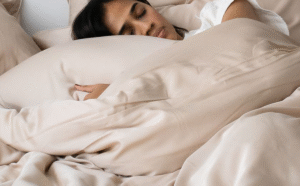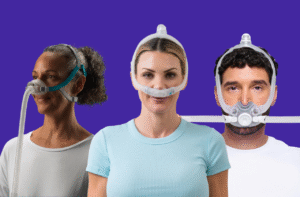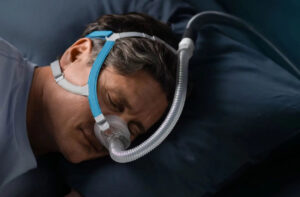Confused Awakenings Might Sign Sleep Dysfunction

Have you ever ever woken up and had no thought the place you had been or what time it was? Perhaps you sat up in mattress, mentioned one thing unusual, or felt completely out of it. If that sounds acquainted, you may need had a confusional arousal.
These episodes may be scary, however they’re extra widespread than you would possibly suppose.
What are confusional arousals?
Confusional arousals are a sort of sleep problem the place you act confused or unusual as you get up or simply after waking. Throughout an episode, it would seem to be you don’t know the place you might be or what you’re doing.
Your habits can embody sluggish speech, confused considering, poor reminiscence, and giving blunt or unclear solutions to questions. Chances are you’ll look awake, however your thoughts feels foggy and unclear. Typically, these episodes occur when another person has to bodily wake you up.
This type of dysfunction is a part of a gaggle of sleep issues referred to as non-REM parasomnias. Non-REM parasomnias normally come up on account of an incomplete awakening from deep sleep, also called sluggish wave or stage N3 sleep. Different non-REM parasomnias embody sleepwalking and sleep terrors.
Why do they occur?
Confusional arousals occur when your mind has bother totally waking up from deep sleep. As a substitute of constructing a clean swap from sleep to wakefulness, a part of your mind stays asleep whereas one other half wakes up. This mix-up can result in confusion or unusual habits.
Why do some individuals have confusional arousals?
Confusional arousals can have an effect on anybody, however some persons are extra more likely to have them. Typically, it runs in households. If a detailed relative has had episodes like this, your possibilities could also be greater too.
Your way of life may also play a giant position. Working in a single day shifts or having a schedule that retains altering can throw off your sleep rhythm. When your physique clock is out of sync, your mind could wrestle to get up the proper method, resulting in confusion.
Psychological well being circumstances like melancholy or bipolar dysfunction can improve the chance too, as can different sleep issues like insomnia or hypersomnia. Additionally, not getting sufficient sleep could make confusional arousals extra probably.
In reality, a examine revealed in Neurology discovered that almost all of confusional arousals (84%) had been related to sleep/psychological issues or psychotropic medicine. Researchers discovered that sleep issues had been current for greater than 70% of confusional arousals, with these with a circadian rhythm sleep problem or who slept 9 or extra hours an evening at greater danger to expertise a confusional arousal.
Typically, particular occasions can set off an episode. These embody ingesting alcohol earlier than mattress, utilizing sure drugs or medicine, and even being woken up all of the sudden. Sleep issues like sleep apnea or periodic limb actions may also trigger your mind to get up in an uncommon method.
How widespread are confusional arousals?
You’re not alone if this has occurred to you. Confusional arousals are particularly prevalent in youngsters and adults underneath 35.
These episodes most frequently seem in early childhood, round age 2. They are typically innocent, although they are often alarming for folks to witness. Most often, confusional arousals of early childhood diminish after age 5.
One giant examine discovered that 17.3% of youngsters between ages 3 to 13 years skilled confusional arousals. The lifetime prevalence is even greater — 18.5% of individuals have had an episode sooner or later of their lives. Amongst adults over age 15, about 3% to 4% expertise confusional arousals.
Confusional arousals, together with sleepwalking and sleep terrors, are thought-about issues of arousal. These are commonest in youngsters and sometimes resolve by puberty. For some, nevertheless, they might persist into maturity.
Confusional arousals have an effect on women and men on the similar charge.
Are confusional arousals harmful?
Most often, confusional arousals aren’t dangerous, however they are often unsettling to witness. An individual could sit up in mattress, mumble, or look proper by you with out responding. This habits can appear unusual or perhaps a little scary, particularly for folks or mattress companions.
In youngsters, these episodes are normally innocent and don’t final lengthy. Most finish inside 5 to fifteen minutes. Nevertheless, as a result of the kid could look confused or agitated, dad and mom usually really feel the urge to step in. Attempting to consolation or wake a toddler throughout an episode would possibly truly make issues worse. It might probably result in extra confusion or an extended occasion.
For adults, confusional arousals are normally not harmful, however in uncommon circumstances, an episode could embody uncommon or aggressive habits. These excessive reactions are unusual, however they are often upsetting and even unsafe if the individual lashes out in the course of the episode.
Despite the fact that these occasions can look alarming, most individuals with confusional arousals don’t want to fret about them being critical or dangerous.
What may help?
Confusional arousals usually occur when sleep is damaged up by different sleep issues. Treating these issues may help cut back the episodes.
For kids, sticking to an everyday sleep schedule on daily basis and ensuring they get sufficient sleep is vital. If episodes maintain occurring, gently waking your youngster about quarter-hour earlier than the standard time could assist.
In some circumstances, drugs could be advisable to assist handle confusional arousals.
When to get assist
In case you or somebody you reside with usually wakes up confused or acts surprisingly in the course of the night time, don’t ignore it. A sleep physician can do a sleep examine to see what’s inflicting the issue and suggest remedy.
Use the AASM’s sleep heart listing to get assist from the sleep group at an accredited sleep heart.
Medical assessment by Ahmed Saleh, MD
Associated:






